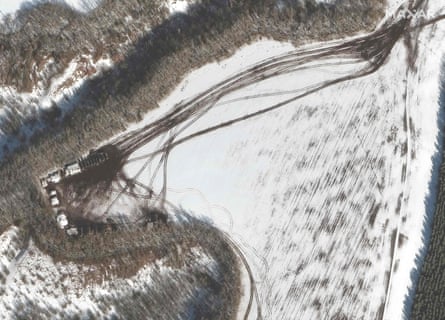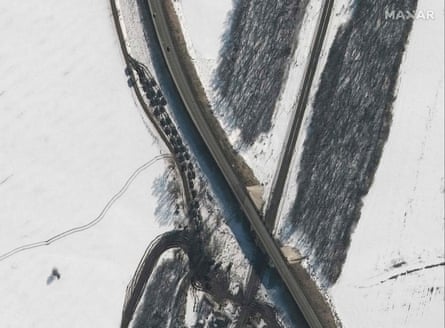The French president, Emmanuel Macron, has invited Vladimir Putin and Joe Biden to attend a summit aimed at de-escalating the Ukraine crisis, and the leaders have agreed in principle, Macron’s office has announced, amid further US warnings that war is imminent.
The Élysée Palace put out a statement on Sunday evening following last-minute diplomatic efforts by the French president to try to dissuade Russia from invading Ukraine.
“Presidents Biden and Putin have each accepted the principle of such a summit,” the statement said. “Its content will be prepared by secretary of state Blinken and Minister [Sergei] Lavrov during their meeting on Thursday 24 February. It can only be held if Russia does not invade Ukraine.”
The White House confirmed Biden’s readiness to hold a summit, but made clear it was wary about the sincerity of the offer.
“President Biden accepted in principle a meeting with President Putin following that engagement, again, if an invasion hasn’t happened, the White House spokeswoman, Jen Psaki, said. “We are always ready for diplomacy. We are also ready to impose swift and severe consequences should Russia instead choose war. And currently, Russia appears to be continuing preparations for a full-scale assault on Ukraine very soon.”

There was no immediate comment from the Kremlin or the office of Ukrainian President Volodymyr Zelenskiy.
Macron spoke twice to Vladimir Putin overnight, for a total of nearly three hours, consulting Joe Biden for 15 minutes in between the two calls. Amid a rising sense of urgency, the second Macron-Putin call was announced well after 2am in Moscow.
The French president said he was seeking to establish a cease-fire in the east of the country, and that the two leaders had agreed to hold discussions in the hope of organising a leaders’ summit to review the future of European security arrangements. But the Kremlin account of the conversation focused on Putin’s allegations of Ukrainian escalation and shelling on the eastern front lines – claims contradicted by reports from the region. It did not respond to an offer of direct talks from Volodymyr Zelenskiy, the Ukrainian president.
Moscow rescinded its undertaking to end military exercises in Belarus which were due to conclude on Sunday, and the Belarus defence ministry said the Russian troops would remain there indefinitely. Satellite images showed more and more Russian combat units advance from staging area to within a few kilometres of the Ukrainian border, in many cases concealing themselves in forests. More than 150,000 Russian troops are estimated to be deployed around Ukraine, while substantial naval forces are off its Black Sea coast.

Biden had been planning to travel to Delaware for a family event on Monday, a public holiday in the US, but canceled the trip on Sunday evening following a rare Sunday meeting of the national security council. US news networks cited intelligence assessment saying that Moscow had issued attack orders to commanders on the ground.
The US secretary of state, Anthony Blinken, said: “Everything we are seeing suggests that this is dead serious, that we are on the brink of an invasion.”.
He added: “...Until the tanks are actually rolling, and the planes are flying, we will use every opportunity and every minute we have to see if diplomacy can still dissuade President (Vladimir) Putin from carrying this forward.”
Earlier, the British prime minister, Boris Johnson, who also spoke to Macron on Sunday, warned that Russia plans to launch the biggest war in Europe since 1945 by attacking Ukraine in a “bloody and protracted conflict”. He said the west would use “all the pressure we can bring” to “make sure that this venture does not succeed”.
The chink of diplomatic light came after Putin spoke on the phone with Macron, his favoured western interlocutor, on Sunday morning, and the outcome, broadly confirmed by the Kremlin, suggests Putin might be willing to step back from the brink of a full invasion of Ukraine to allow renewed diplomatic discussions. If he is not, he is instead involved in an elaborate deceit of the French.
Under the plan, the French foreign minister, Jean-Yves Le Drian, will meet with his Russian counterpart, Sergei Lavrov, on Thursday to work on the possible summit at the highest level with Russia, Ukraine and allies, the Élysée said.
The two leaders also agreed to resume work on a separate meeting “within the framework of the Normandy format”, meaning the participants will be Russia, Ukraine, France and Germany, Macron’s office and the Kremlin said.
Putin and Macron would also work “intensively” to allow the Trilateral Contact Group – which includes Ukraine, Russia and the Organization for Security and Co-operation in Europe – to meet “in the next few hours” in an effort to secure a ceasefire in eastern Ukraine where government troops and pro-Russian separatists are facing each other, according to the Elysée statement.
It is too early to say if Macron has pulled off a last-minute diplomatic coup, or if he will have the full support for his initiative from London. So far, most of the French president’s diplomatic moves have been coordinated with the White House.
Gérard Araud, a former French diplomat, defended Macron, saying: “he is today the only western leader actively engaged in finding a peaceful way out of the current crisis. He does know that he may fail, and probably will, but he is right to try, and deserves our support and understanding.”
The Élysée statement said “intense diplomatic work will take place in the coming days”, including several consultations in the French capital, adding that the two leaders also agreed on “the need to favour a diplomatic solution to the ongoing crisis and to do everything to achieve one”.
An Élysée official confirmed further talks between the two leaders were scheduled, but said Putin and Macron clearly had “different interpretations” of what was happening in the Donbas region and who was to blame, with the French president arguing that pro-Russian separatists were responsible, and the Russian leader insisting it was Ukrainian forces.
The Élysée official said Macron would be talking “in the next few hours” to the German chancellor, Olaf Scholz. Further calls were likely to be placed to Johnson, the Italian prime minister, Mario Draghi, and other close partners, the official said.
They added that Putin had reiterated that Russia “intends to withdraw its troops” from Belarus once ongoing exercises were complete. “All this will have to be verified, and that could take some time,” the official said, noting that statements by the Belarus authorities “do not appear to match Putin’s words”.
The Belarusian defence minister said Russia and Belarus were extending military drills that were due to end on Sunday, in a step that further intensifies pressure on Ukraine.
The Kremlin said that in the phone call, Putin had expressed serious concern over the sharp deterioration of the situation on the line of contact in Donbas.
The Russian statement added: “Taking into account the acuteness of the current state of affairs, the presidents considered it expedient to intensify the search for solutions through diplomatic means through the foreign ministries and political advisers to the leaders of the countries participating in the Normandy format. These contacts are designed to help restore the ceasefire and ensure progress in resolving the conflict around Donbas.”
The Kremlin insisted Putin was not withdrawing any of his wider demands, saying he “reiterated the need for the United States and Nato to take Russian demands for security guarantees seriously and respond to them concretely and to the point”. It made no reference to Macron’s proposed leaders’ summit.
The statement added that Putin blamed the escalation in Donbas on the provocations of the Ukrainian security forces, and that he complained of the continuing provision of modern weapons and ammunition to Ukraine by Nato countries, “which is pushing Kyiv towards a military solution to the so-called Donbas problem”.
